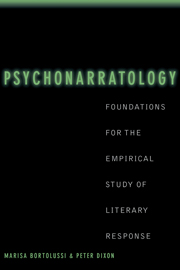Book contents
2 - Preliminaries
Published online by Cambridge University Press: 28 July 2009
Summary
In the present chapter, we present a framework and methodology for the empirical study of psychonarratology and discuss some of the epistemological issues that form the background for this kind of research. Following a discussion of the domain of psychonarratology, we elaborate on four aspects of the methodology that are central to its study. First, we discuss the distinction between features and constructions introduced in Chapter 1 and describe criteria for developing useful textual features. Second, the term “statistical reader” is introduced; this term describes an approach in which aggregate measures of groups of individuals are used to provide insights into the general characteristics of populations of readers. Third, we sketch some of the epistemological assumptions involved in conducting empirical research in psychonarratology and outline the theoretical goals. Fourth, we argue that the strongest inferences about reading processes can only be obtained by conducting “textual experiments” in which the text is manipulated and concomitant changes in readers' responses are observed. Together, these notions provide a foundation for the empirical investigation of the problems of psychonarratology.
This chapter was designed in part to address the needs, interests, and concerns of literary scholars who may be intrigued by the empirical study of literary response but lack the confidence to pursue it on their own. In particular, we have endeavored to outline the fundamentals of empirical research without recourse to specialized knowledge or vocabulary. As we discuss in Chapter 1, the very word “statistics” may have unpleasant connotations for literary scholars.
- Type
- Chapter
- Information
- PsychonarratologyFoundations for the Empirical Study of Literary Response, pp. 34 - 59Publisher: Cambridge University PressPrint publication year: 2002



